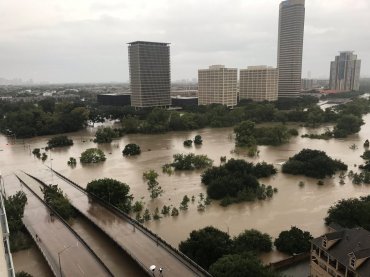
Base oil and additive plants along Texas Gulf Coast stand idle as Hurricane Harvey brought record flooding to one of the worlds highest concentrations of raw material supply for the lubricant industry.
With water levels still rising, companies said it was too soon to say when facilities would reopen. The industry awaited damage assessments as the rain spread eastward from Houston, raising the threat of similar impacts for more plants near the Texas-Louisiana border.
It will take some time to bring plants back online after they have been shut down – longer if they were damaged by flooding, Jamie Brunk, manager for lube studies at HSB Solomon Associates, said on Monday.
More than a quarter of U.S. base oil capacity now stands idled. Motiva was the latest company to announce a closing, issuing a statement early this morning that it had begun a controlled shutdown of its Port Arthur, Texas, refinery because of increasing flooding. That refinery includes the worlds second-largest base oil plant, a Group II facility with capacity of 40,300 barrels per day.
Among the other facilities that closed are:
- ExxonMobils Baytown, Texas, refinery, which includes a 28,000 barrel per day base oil plant, the nations second-largest, and a 50,000 metric ton per year high-viscosity polyalpha olefin plant;
- ExxonMobils Beaumont, Texas, refinery, which includes a 146,000 t/t PAO plant;
- Valeros Three Rivers, Texas, refinery and 2,400 b/d base oil plant;
- Lubrizols lubricant additive plant in Deer Park, Texas, the companys largest in North America;
- Chevron Phillips Chemicals 58,000 t/y polyalphaolefin plant in Cedar Bayou, Texas;
- TPC Groups 141,000 t/y polyisobutene plant, the largest in North America, in Houston; – Huntsmans chemical refineries in Port Neches and Conroe, both of which include polyalkylene glycol plants.
The Port Arthur plant, ExxonMobils Baytown plant and Valeros Three Rivers facility account for a combined 27 percent of U.S. base oil capacity.
All of the companies with confirmed closings said it was too soon to say when their facilities will reopen. Lubrizol said its facilities sustained minimal damage, but other companies said damage had not yet been assessed.
Harvey was expected to produce additional rainfall accumulations of 6 to 12 inches to the north and east of Houston, from far east Texas into southwestern Louisiana, the National Weather Service said in an advisory and 48-hour outlook late yesterday. Elsewhere, Harvey is expected to produce total rainfall amounts of 5 to 10 inches across portions of southern Louisiana.
According to media reports, water was overflowing two key reservoirs – Addicks and Barker – within 15 miles of Houston despite intentional water releases by operators. Officials said conditions were unprecedented, and that they were uncertain how the reservoirs would handle the situation.
The big questions for the lubricant industry will be how long until the closed plants reopen and whether large plants near the Texas-Louisiana border also have to halt operations. Motivas 40,300 b/d plant in Port Arthur, Texas, is the worlds largest, and the Excel Paralubes 22,000 b/d plant in Westlake, Louisiana, is the nations fifth largest.
The industry does not have to look back so many years to recall the type of trouble hurricanes can cause it. In 2008, ExxonMobils Beaumont PAO plant sustained damage during Hurricane Ike that forced the company to impose customer allocations for synthetic lubricants that lasted for four months. In August 2005, flooding from Hurricane Katrina caused damage to Chevrons Oronites main North American lube additive plant, in Belle Chasse, Louisiana, which did not reopen until October of that year.
Photo: Twitter/@caroleenarn via Reuters

Harvey hit Texas southeast coast Friday as a Category 4 hurricane, but while winds and sea surge did cause some damage, it quickly became more of a flood threat as winds slowed and the storm settled over Houston.
While wind damage could have initially been the reason for closures, the bigger peril is now apt to be flooding, especially in Port Arthur and Beaumont [Texas] area, Stephen B. Ames, of SBA Consulting in Pepperpike, Ohio, said on Monday. In addition to the impact on their suppliers, he added that Harvey stands to affect lubricant blenders own manufacturing facilities.
The many lubricant blend plants in the Houston area may have been heavily impacted from possible flooding and the likely disruption of logistic services that move raw materials and finished products in and out, he said.
– Gabriela Wheeler and Boris Kamchev contributed to this report